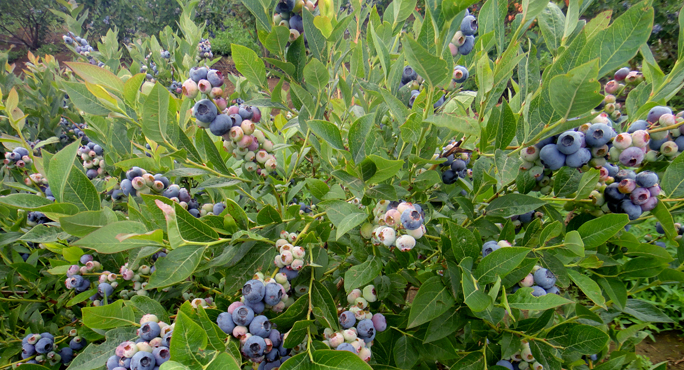Blueberries, Chile. Photo by Zoe Helene
It’s almost summer, and various berries are ripening. Soon we’ll have available to us fresh blueberries, strawberries, raspberries, cranberries and more. Over the past twenty years, we’ve learned an enormous amount about the nutritional and medicinal value of berries. Per gram, fresh or frozen berries are among the healthiest foods you can put in your body. Scientists, doctors and other health experts all agree that including seasonal berries in your diet can make a valuable contribution to your overall health.
Blueberries
High in vitamin C and fiber, blueberries are also a good source of the mineral manganese, which plays an important role in proper bone formation and healthy metabolism. Native to North America, blueberries grow on shrubs, and offer a sweet flavor. They are especially rich in antioxidants, and are among the most powerful of the protective foods. Blueberries are especially high in potent purple pigments called anthocyanins. These blue colors are the most powerful antioxidants in nature, and also demonstrate anti-inflammatory activity and mood-enhancing properties. They also help to lower cholesterol and reduce the risk of heart attack and stroke. What does this mean? Blueberries eaten daily in season (or frozen the rest of the year) can provide great nutrition and powerful cellular protection, and can help to reduce the risk of all degenerative diseases. Look for certified organic blueberries, to minimize your intake of agricultural toxins.
For more information on blueberries, check out The Blueberry Council.
Also, check out Chris' blueberry rich Longevity Smoothie recipe for turning back the clock.
Strawberries
A good source of vitamin C, folic acid and natural vitamin A, strawberries aren’t actually berries at all, but are nonetheless beloved across Asia, Europe and North and South Americas. A very good source of antioxidants, strawberries are an especially rich source of the super-compound kaempferol, an antioxidant that also demonstrates dozens of specific activities, including anti-inflammatory, anti-cancer and anti-ulcer properties. Additionally strawberries contain ellagic acid, quercetin and cholorogenic acids, all of which protect the heart, enhance metabolism, retard the aging process of our cells, reduce inflammation, and reduce the risk of many degenerative diseases. Strawberries are among the crops most highly sprayed with toxic pesticide, so look for certified organic berries and eat them in good health. For additional strawberry information, click here.
Raspberries
Delicate, sweet and almost too good to be true, these power-packed berries are found in Europe, North and South Americas, Asia and Australia. Rich in the protective antioxidant compounds ellagic acid, cyanidins, quercetin and kaempferol red raspberries demonstrate anti-inflammatory activity, anti-cancer properties, and heart-protective benefits. The same compounds appear to play protective roles in reducing the risk of diabetes. Specific ketones in raspberries may also help to reduce the production of fat in the body. In animals, raspberry helped to protect the liver against lesions. Human studies are needed to confirm this protection. Admittedly, its their succulent flavor that drives people to eat raspberries, but the powerful compounds in these small fruits make them little medicine chests as well.
Cranberries
While many people only consume cranberries at Thanksgiving, these fruits offer very potent health benefits. Cranberries grow on shrubs, and are distributed throughout the Northern hemisphere, in North America, Europe and parts of Asia. Cranberries are grown commercially in North America, where Native Americans used the berries fresh and dried. Cranberries were often included in the concentrated food pemmican, and were also used by native people as a red dye. Cranberries have emerged as powerful medicine against urinary tract infections. The antioxidant compounds in cranberries inhibit infectious bacteria from sticking to the walls of the urinary tract. Additional science shows that cranberries protect against stomach ulcers, heart disease, and some forms of cancer. The message? Think past Thanksgiving, and drink certified organic cranberry juice regularly.
For more information on cranberries, check out The Cranberry Institute.
As we learn more about what’s in various foods, we are developing a better understanding of the ways that certain foods can provide high quality nutrition and reduce the risk of disease. In berries, we have concentrated super foods that taste delicious, provide good basic nutrition, and contain profoundly beneficial compounds that can reduce the risk of many diseases, and promote vigorous health.


